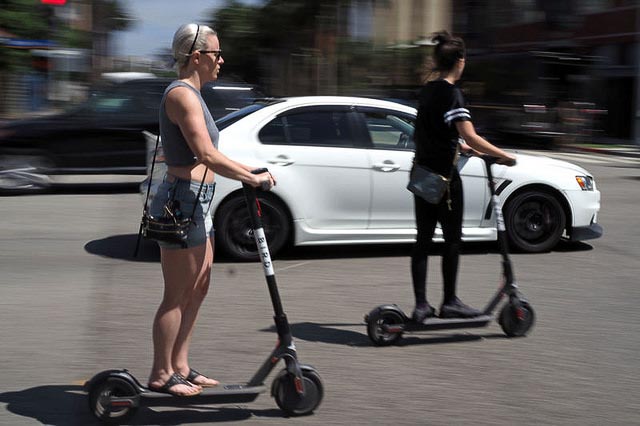Traffic in Houston isn't getting any better as about 259 people move to the Bayou City every day. Could dockless scooters be part of the solution, facilitating smaller commutes in an attempt to lower the number of cars on the roads?
Several dockless scooter companies, including Bird, Lime and Uber's Jump, are popping up around the country, including in Dallas, San Antonio and Austin, but not Houston.
For those unfamiliar, dockless scooter companies deploy fleets of battery-powered scooters that travel up to 15 miles per hour and can be accessed through a mobile application. To ride a scooter from Bird, for example, the user rents the scooter for a rate of $1 to unlock and 15 cents per minute. The app locates unrented scooters, allowing users to park it almost anywhere when done riding (but preferably not in the middle of the sidewalk).
Currently, Bird is operating in more than 100 cities worldwide and has expanded to international locations, though not always in compliance with local regulation. Bird's approach to expanding their business is much like Uber’s: better to ask forgiveness after than seek permission before launching. Similarly, Bird has a reputation of dropping hundreds of scooters on city sidewalks, building up demand by users and then stepping back and watching as local officials scramble to respond to the new demand.
So, if Austin, Dallas and San Antonio all have scooters, people are asking, when will Houston finally debut the new transportation tech? In short, the city is working on it, according to Lara Cottingham, chief sustainability officer for the City of Houston.
"The mayor has given the green light for it to come back to city council once the safety concerns have been addressed," Cottingham said. She continued to say that their office has seen dockless bike proposals, but before approving anything the city wants to get safety protocols solidified instead of having the scooters just show up on the streets and city officials rushing to get regulations in place.
She notes that some cities set certain restrictions, including the speed you can go on a scooter (usually no higher than 15 miles per hour) and where the scooters must be ridden (in some cases on the streets and in others on the sidewalks). While she didn't confirm an approximate time the scooters might make their debut in Houston, she did note that it's a work in progress.
Safety is a hot topic when it comes to scooters amid reports of scooter-related accidents — a few resulting in fatalities — and with some in the medical profession demanding the control of the scooter industry.
"It's a pattern regularly repeated with new consumer technology: sell it first, ask questions later," medical analyst and physician Ford Vox wrote for CNN. "This is, of course, backwards. When health and safety are on the line, it is crucial that one company's legitimate right to come up with a handy new product (and money-making scheme) doesn't infringe on your right to move freely in public spaces without fear of serious injury."
Little data has been collected on the safety of scooters - especially in comparison to other modes of transportation, like cars and buses. A Center for Disease Control study will try to tackle some of the safety concerns by focusing on the incidents and injuries that occurred in Austin from September 5 to November 4 of 2018. This study hopes to shed light on the dangers of scooter use, particularly relative to automobile use, which is responsible for killing 40,000 Americans a year, and emitting climate-warming gases while doing it.
The safety aspects of the dockless scooters are one priority for the city, but there is also a social aspect to this new tech that officials have to take into account.
After the flood of scooters started showing up in cities across America, a social media campaign against the tech tagged #ScootersBehavingBadly began. The hashtag chronicles instances where the scooters are proving to be more of a nuisance than a positive addition to an urban landscape. There are also Instagram accounts, like @atxscooterlitter, which highlight the instances where scooters are misused.
"We're just trying to get people out of cars; there's a CO2 crisis," David Estrada, chief legal officer for Bird, told USA Today. To do that at all income levels, both Lime and Bird have transportation equity initiatives where users on government assistance can enroll in discounted rates.
Since their introduction in cities, officials have taken various approaches to regulate both the safety and social issues caused by scooters. In Austin, officials have kicked off a permit-based pilot program that requires scooter companies to carry insurance and encourages scooter riders to leave the devices at bike racks or newly-implemented charging stations instead of scattered along sidewalks. In Denver, city officials are writing regulations and are impounding scooters found creating a public nuisance.
“The only way that we can solve this problem is if we have enough of this alternative public transportation on the road,” Estrada told Texas Tribune. “This is the most promising solution we’ve seen, and if cities really want to solve traffic they need to embrace this type of solution. If we overly restrict it … we are choosing more cars. We need to choose less cars.”
The business opinion writer for the Houston Chronicle, Chris Tomlinson, similarly supports diversifying the city's transportation options here in Houston, writing, "We should celebrate technology that presents us with more options for mundane tasks. We should open our minds to choosing from a menu of transportation options and not rely only on the venerable car or truck."

